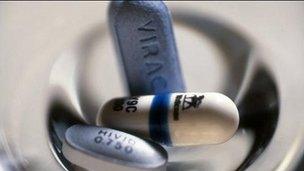Aids-related deaths 'down 21% from peak', says UNAids
- Published

Access to combination HIV therapy has significantly improved
Aids-related deaths are at the lowest level since their 2005 peak, down 21%, figures from UNAids suggest.
Globally, the number of new HIV infections in 2010 was 21% down on that peak, seen in 1997, according to UNAids 2011 report, external.
The organisation says both falls have been fuelled by a major expansion in access to treatment.
Its executive director, Michel Sidibe, said: "We are on the verge of a significant breakthrough."
He added: "Even in a very difficult financial crisis, countries are delivering results in the Aids response.
"We have seen a massive scale up in access to HIV treatment which has had a dramatic effect on the lives of people everywhere."
'End in sight?'
This latest analysis says the number of people living with HIV has reached a record 34 million.
Sub-Saharan Africa has seen the most dramatic improvement, with a 20% rise in people undergoing treatment between 2009 and 2010.
About half of those eligible for treatment are now receiving it.
UNAids estimates 700,000 deaths were averted last year because of better access to treatment.
That has also helped cut new HIV infections, as people undergoing care are less likely to infect others.
In 2010 there were an estimated 2.7m new HIV infections, down from 3.2m in 1997, and 1.8m people died from Aids-related illnesses, down from 2.2m in 2005.
The figures continue the downward trend reported in previous UNAids reports.
The UN agency said: "The number of new HIV infections is 30-50% lower now than it would have been in the absence of universal access to treatment for eligible people living with HIV."
Some countries have seen particularly striking improvements.
In Namibia, treatment access has reached 90% and condom use rose to 75%, resulting in a 60% drop in new infections by 2010.
UNAids says the full preventive impact of treatment is likely to be seen in the next five years, as more countries improve treatment.
Its report added that even if the Aids epidemic was not over: "The end may be in sight if countries invest smartly."
'Promising moment'
The charity Medecins Sans Frontieres urged governments to keep up their funding.
MSF's Tido von Schoen-Angerer, said: "Never, in more than a decade of treating people living with HIV/Aids, have we been at such a promising moment to really turn this epidemic around.
"Governments in some of the hardest hit countries want to act on the science, seize this moment and reverse the Aids epidemic. But this means nothing if there's no money to make it happen."
The International HIV/Aids Alliance said: "We welcome the ongoing commitment of UNAids to changing behaviours, changing social norms and changing laws, alongside efforts to improve access to HIV treatment.
"For bigger and better impact though, we must not be complacent. There is still much more to do."
- Published1 September 2011
- Published4 June 2011
- Published12 May 2011